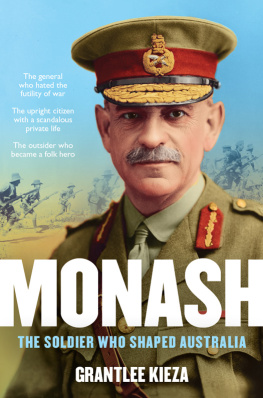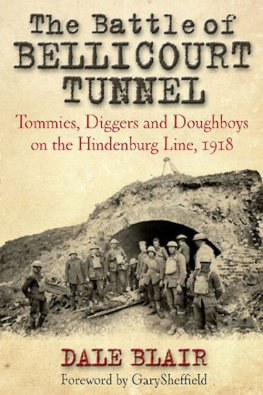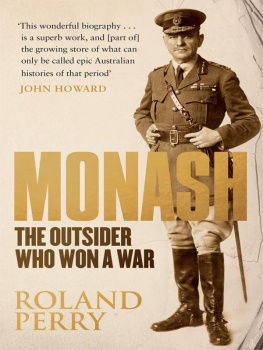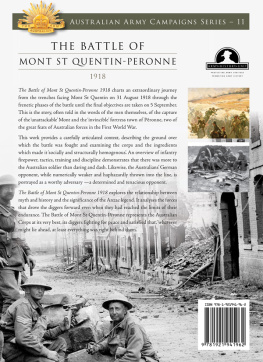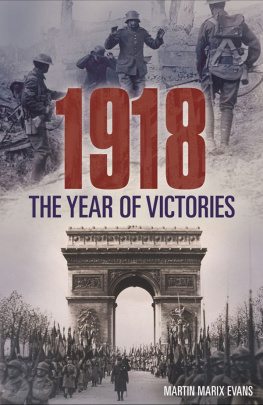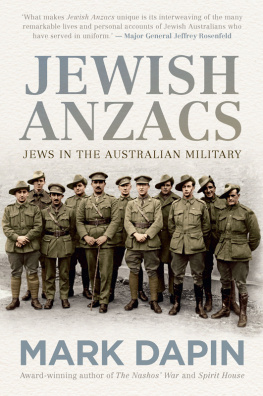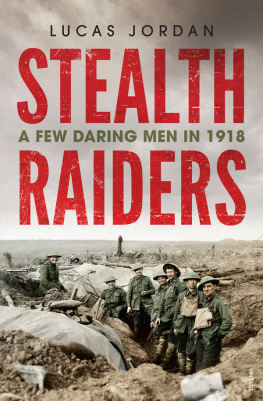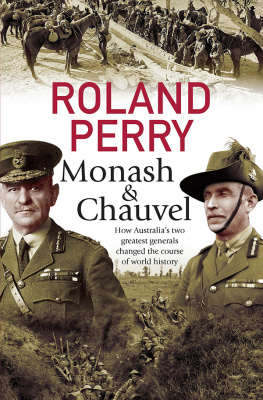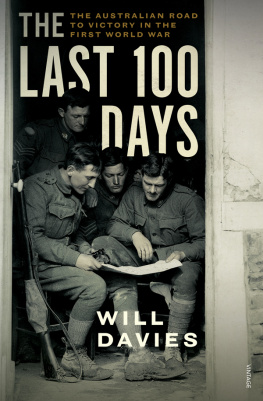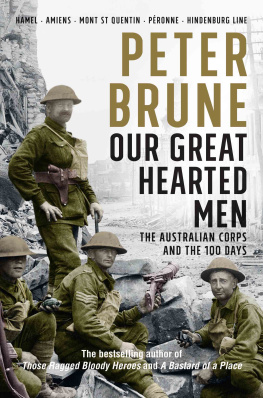PRAISE FOR THE AUSTRALIAN VICTORIES IN FRANCE IN 1918
The definitive eyewitness account of Australias greatest military achievement by Australias greatest military commander, it perhaps eclipses even Beans official history as the most important book ever written about Australias Great War.Hugh White, Professor of Strategic Studies, ANU, and author of The China Choice
This commendable volume explains how the 1st AIF, the biggest of twenty Allied Corps on the Western Front, had a huge say in the outcome of World War I. Its detailed battle plans also had a big influence on World War II. In 1937 General Heinz Guderian copied all Monashs battle plan for Amiens into his own book, Achtung Panzer!. He then demonstrated to Hitler Monashs successful blitzkrieg methods, which were adopted for the German attacks in Europe.Roland Perry, author of Monash: The Outsider Who Won a War
In the eyes of many Monash was the greatest Allied Field Commander of World War I. His leadership of the Australian Army Corps in 1918 was exemplary.John Howard, former Prime Minister of Australia
His study of Law, Arts and Engineering greatly helped John Monash not only to provide brilliant, innovative leadership in World War I, but also to write clearly and in an enticing way. His superb war letters and accounts of the Western Front contain wonderful first-hand insights into this seminal period of world history.Tim Fischer, former Deputy Prime Minister and author of Maestro John Monash
His was the most brilliant leadership ever shown in any activity by an Australian.Bob Carr, former Premier of New South Wales
John Monash was one of the most remarkable men to rise from civilian life to high-level combat command in any war. The greatest general Australia has ever produced, and an equal of any during the world wars.Eliot A. Cohen, Professor of Strategic Studies, Johns Hopkins University, and author of Supreme Command

Published by Black Inc.,
an imprint of Schwartz Publishing Pty Ltd
3739 Langridge Street
Collingwood VIC 3066 Australia
email:
www.blackincbooks.com
First published by Hutchinson & Co., London, 1920
This edition published by Black Inc., Melbourne, 2015
Foreword Bruce Haigh 2015, who asserts his right to be known as the author of his work.
ALL RIGHTS RESERVED.
No part of this publication may be reproduced, stored in a retrieval system, or transmitted in any form by any means electronic, mechanical, photocopying, recording or otherwise without the prior consent of the publishers.
The National Library of Australia Cataloguing-in-Publication entry:
Monash, John, Sir, 18651931, author.
The Australian Victories in France in 1918 / John Monash; Foreword by Bruce Haigh
9781863957458 (hardback)
9781925203349 (ebook)
Australia. Army. Australian Imperial Force (19141921)
World War, 19141918 Campaigns France.
World War, 19141918 Participation, Australian.
940.434
Cover and text design: Peter Long
Biographical data in this index researched by A.K. Macdougall
Photographs reproduced with permission of the Imperial War Museums and the Australian War Memorial.
Map reproductions courtesy of the State Library of Victoria
FOREWORD
T his book enlarges our understanding of the contribution of the Australian Imperial Forces to the final battles of World War I in France. Its strong and detailed narrative was provided by a general whom superiors, fellow generals and, most importantly, the Australian and American troops he commanded acknowledged as a master of the art of soldiering and winning.
Monash wrote Australian Victories over a couple of months in the latter part of 1919, while the battles were fresh in his mind and he had essential papers to hand. It was published in 1920. Monash was keen to get his version of the events in which Australia had played such a crucial role into the public domain before other accounts were produced which might downplay that contribution. There was also the question of his future. No doubt Monash believed that his recent achievements, if properly set down and explained, would increase his profile and open doors to greater influence.
Throughout the war Monash felt the achievements of the AIF were not sufficiently recognised, and he blamed, among others, Charles Bean, the official Australian war correspondent, for this. Monash regarded Bean as a political and intellectual lightweight he said of his report on the Battle for Messines that it was the apotheosis of banality Not only is the language silly tosh, but his facts are, for the most part, quite wrong. But he had reason to hold an even more critical view of him. Bean had contrived with another journalist, Keith Murdoch, to deprive Monash of his appointment to head the new Australian Corps formed in 1918. The pair shamelessly lobbied senior British and Australian officers and politicians, including the mercurial Australian Prime Minister, Billy Hughes, with the argument that Monash was not the man for the job. Hughes was inclined to concur, until he discussed the appointment with senior Australian military figures in France, all of whom supported Monash.
Beans objections were racist and some appeared in his diaries: Yes Monash will get there he must get there all the time on account of the qualities of his race; the Jews will always get there, (17 May 1918). In his biography of Monash, Roland Perry wrote that, Bean would not have someone he described as a pushy Jew running the most important position in the AIF. In the last volume of The Official History of Australia in the War of 191418, published in 1942, Bean refers to Monash as Jewish-Australian and hints that some were still unhappy with his appointment. He also claimed Australian Victories contained errors, but did not identify any.
Monash understood, as few other generals did, the changed nature of warfare. Not hampered by the groupthink of professional army officers, he turned being outside the club to his advantage. Monash the engineer saw that war was a matter of machines, timetables, roads, railways, resupply and above all meticulous planning. The machinery of war, with its massive destructive power, was best deployed to advance and protect men. He pioneered combined infantry/tank operations and resupply by aircraft and mobile artillery, and adopted and adapted many new ideas and procedures. His use of tanks so impressed the Germans that they used his tactics in World War II.
Monash begins Australian Victories with the German offensive of 21 March, when he was commander of the 3rd Division. He moves quickly to his appointment as Corps Commander on 18 May 1918, without any mention of the plotting and scheming against him by Bean and Murdoch.
By June Monash commanded a corps the size of a small army; it was the biggest in the British Army. On that basis alone, he should have been made a full general, and for the brilliance of his leadership should have been made a Field-Marshal. By the end of the war, he was seen as having the ability to be Commander-in-Chief of the British and Dominion Forces.
Monash demonstrated his moral courage when the American troops assigned to him for the Battle of Hamel on 4 July 1918 were withdrawn by their commander, General Pershing. Monash threatened to cancel the operation, which forced the British Commander, Field-Marshal Haig, to overrule Pershing. The Hamel action was successful and formed the basis of Monashs attack along the Somme Valley on 8 August, known as the Battle of Amiens.



